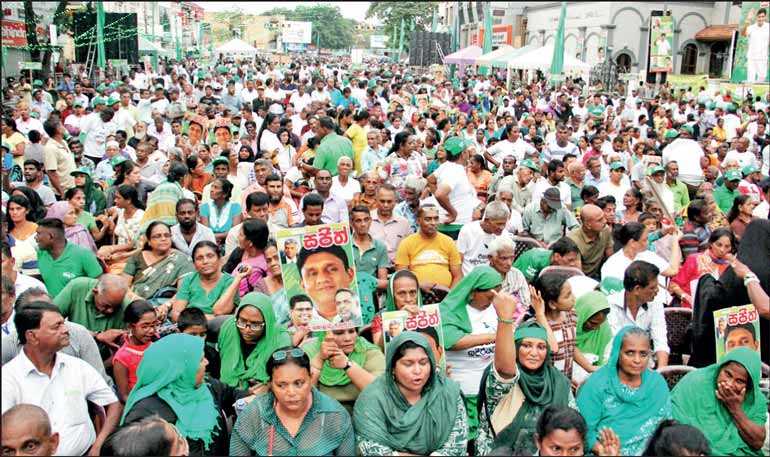Thursday Feb 26, 2026
Thursday Feb 26, 2026
Thursday, 14 November 2019 00:00 - - {{hitsCtrl.values.hits}}

New Democratic Front (NDF) presidential candidate Sajith Premadasa said yesterday that the tourist industry will be categorised as an export industry within 48 hours of his winning the election. This will make available to it all relief provided to export industries.
 |
Sajith Premadasa |
In addition to this, steps towards poverty alleviation will be taken, firstly in identifying what poverty is and who falls under the category. “For decades, no one had a proper understanding of poverty. I have this understanding. According to the Statistics and Census Department, for a family of four, the monthly income should be between 50,000 and 55,000 rupees. This was said over a year ago … In my view, all families that don’t meet this requirement can be considered to be poor,” Premadasa said, adding that in his presidency, he will increase the quality of life of such families.
The NDF candidate also spoke about the kind of President the country needs, saying, “They should be able to talk to the people. They should have a good understanding of the emotions and sensitivities of the people. They should offer solutions to the problems of the people.”
“I’ve been with the people since 1994. I don’t need to learn about understanding people’s sensitivities from anyone. I don’t need teleprompters, unlike my main rival. My manifesto is based on the experience gathered over these 25 years,” Premadasa said, explaining that all policies included in his election manifesto were important to the citizens of this country.
He went on to say that, in his Ministerial role, he didn’t accept a salary, official residence, or State vehicle. “I will continue this to the presidency. I will be the first President who doesn’t accept the President’s salary and benefits,” he said.
Premadasa explained that under his Presidency, there will be no more purchases of duty-free vehicles as well as luxury vehicles for Ministries. “We won’t waste taxpayers’ money on renovating the offices and official residences of the President, Prime Minister, and Ministers,” he added.
In addition to the above policies and plans outlined in the NDF election manifesto, Premadasa also mentioned the alleviation of poverty, saying that for many decades, there was no proper understanding of poverty. “We will provide citizens with relief packages. We will combine the Samurdhi Program and Janasaviya, and within a short time, alleviate poverty,” he said.
While offering tax concessions to the middle class and loans to the business community, a 300,000 interest-free loan will be given to three-wheeler drivers.
As for the education sector, Premadasa spoke about making pre-school education free to all, with two sets of uniforms, school shoes, and lunch provided to the students. In addition to this, assistant teachers will also receive a higher salary. These reforms in the education sector will benefit 4.4 million school children.
IT parks, industrial hubs, and technical colleges will also be established in all District Secretariats, Premadasa said, explaining that these steps will boost a digital revolution in the country. Steps will also be taken to increase youth employment, with facilities for youth to work from home.
Communication between the President and the general public will also be strengthened through special units set up in all Divisional Secretariat offices, where people can present their problems and receive a solution from Premadasa himself within a 24 hour period.
“Through e-governance, I will make this work. I can see how many questions are asked, and how many have been solved,” he said.
Premadasa’s policies also cover women’s issues, where, in addition to providing sanitary products at a lower cost, focus will be drawn to women’s health issues like cervical cancer, kidney disease, and other medical conditions related to the reproductive system.